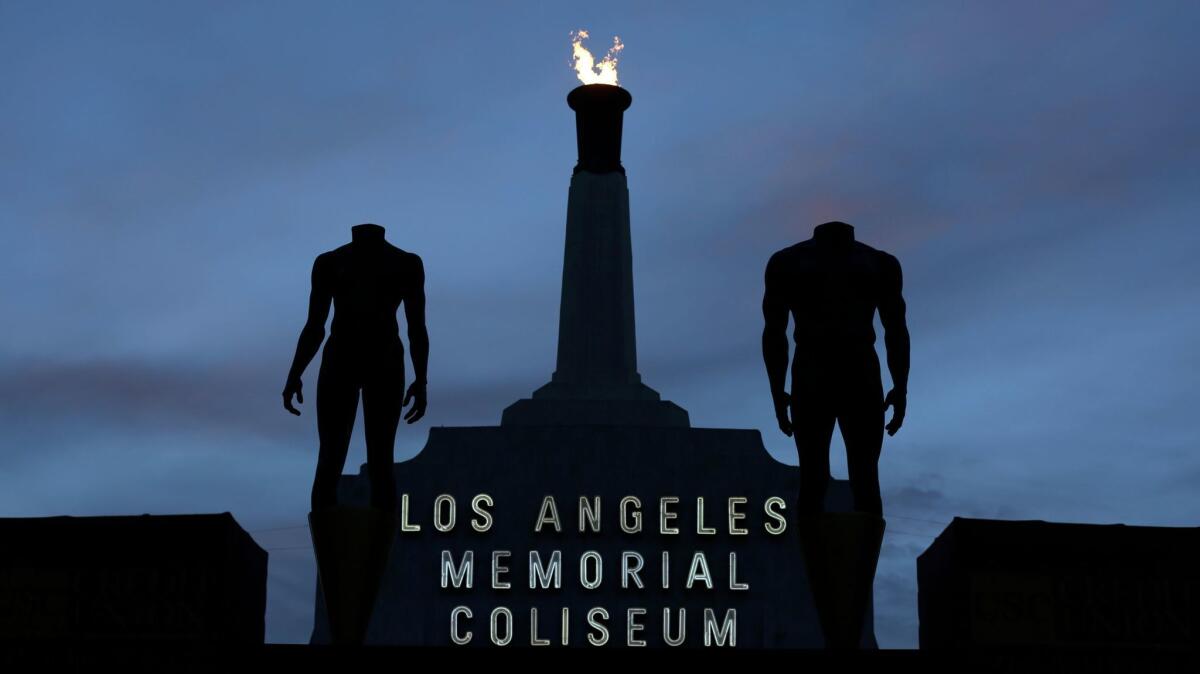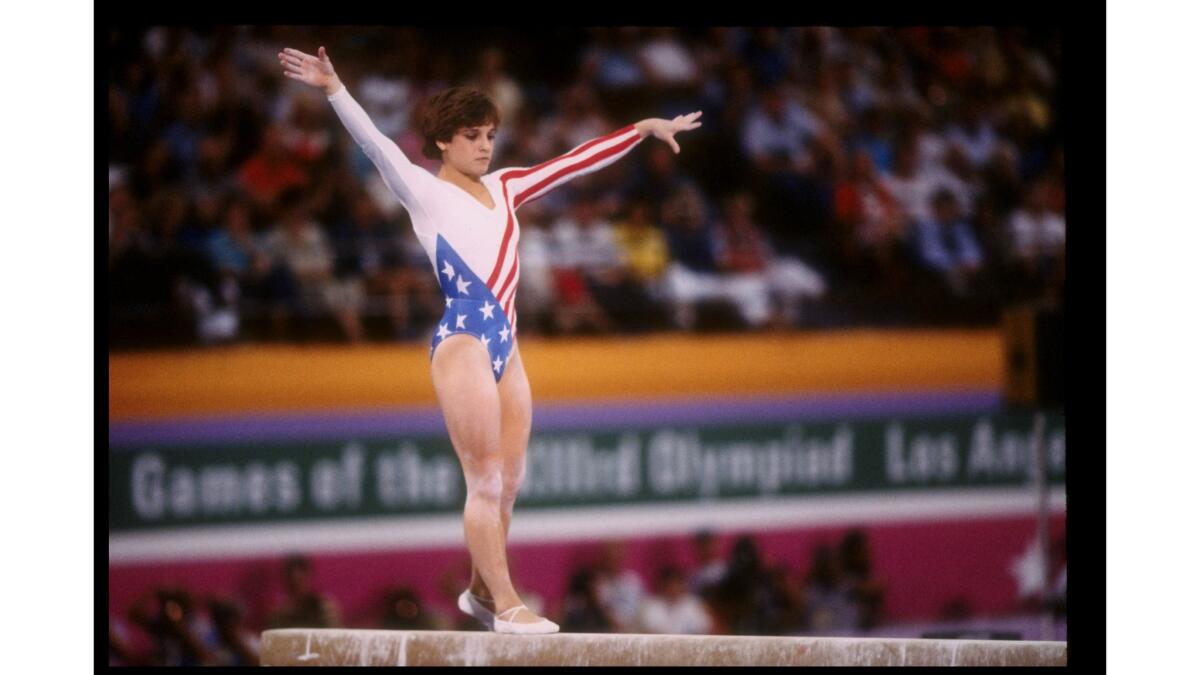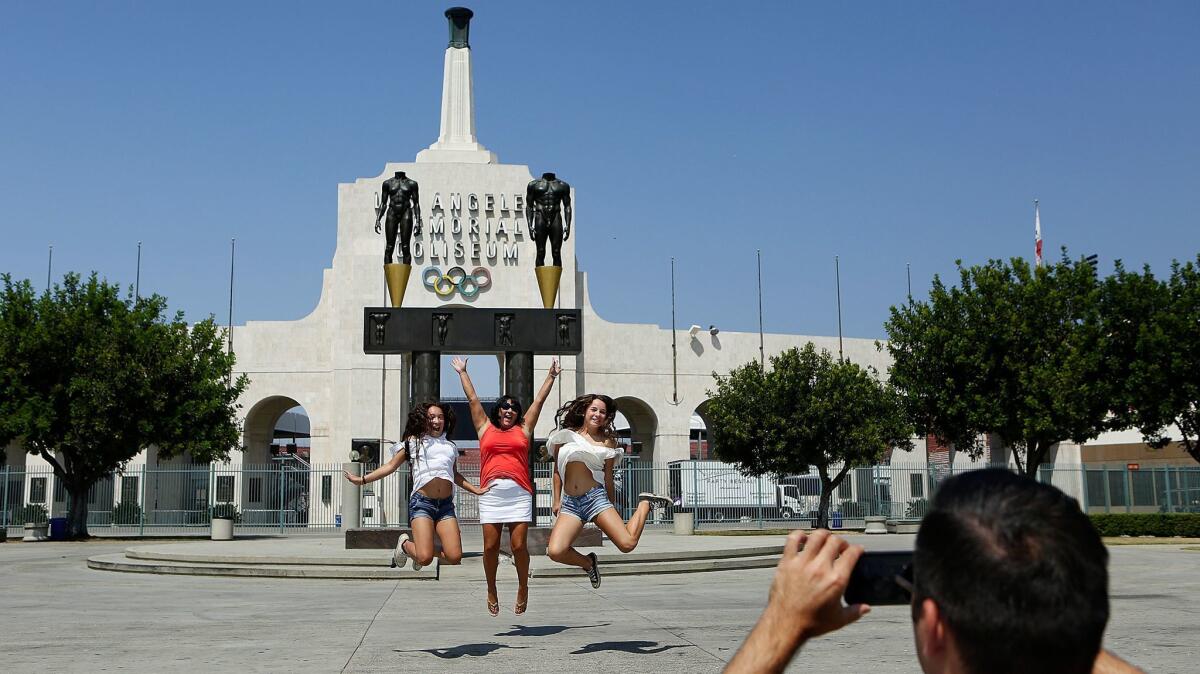A dream and a reality, the 2028 Olympics give Los Angeles a chance to imagine its future

- Share via
When asked to explain the secret of Los Angeles on the eve of the 1984 Olympics, the late poet, novelist and fantasist Ray Bradbury broke it down, capturing the ingenuous advantage the city enjoyed as it was coming of age.
“L.A. is a conglomerate of small towns striving toward immensity and never making it, thank God,” he wrote. “We have no kings, queens, or courts, no real pecking order, no hierarchies to prevent those of us who care to lean into creativity from running loose in the big yard.”
With that creativity and freedom, he continued, “we have conquered the world and don’t have enough sense to know it. Maybe it’s just as well. With such knowledge comes arrogance. We are not arrogant yet, although I detect signs of it ….”
More than 30 years later, it is hard to imagine what Bradbury would make of last week’s announcement that Los Angeles will host the Olympics in 2028. The city today is approaching the immensity that he seemed wary of.
Downtown, once stagnant and overlooked, is thriving, its skyline ever-evolving. The Dodgers and Dudamel are on a roll. George Lucas is breaking ground on a museum in Exposition Park. Two football teams compete in the city’s backyard, and a subway system is tunneling its way toward the sea.
What once was a blank slate is now crowded with — if not inhibited by — expectations.
Add the Olympics to the mix, and it is perhaps understandable that the reaction has been slightly fuzzy. Los Angeles is no longer powered by the innocence that Bradbury described. By many measures, it has become the world-class city that it could only once dream of.
But the Olympics have always been a measure of our aspirations, and by winning this international nod, the city not only shows itself to the world but also puts a mirror up to itself.
What will Los Angeles look like in 11 years? Less an exercise in crystal-ball gazing, the question is an opportunity to consider the future the city wants to make real.
::
Since the inauguration of the modern Games, the Olympics have become both an aspiration and a distraction for cities around the world, including Los Angeles.
This dusty burg won the 1932 Games in 1923, the same year the Hollywoodland sign was unveiled, the Walt Disney Co. established, and Amelia Earhart — who learned to fly in Long Beach — was awarded her pilot’s license. Despite Prohibition, the Jazz Age was swinging, and the dancing wouldn’t stop until Black Tuesday, 1929.
Three years later, fantasy was in high demand as soup kitchens, shuttered factories and foreclosed homes crowded the landscape, and in the lead-up to the Summer Games, the Los Angeles Times attempted to shift the focus to a fireworks display in Pacific Palisades and tennis parties in Santa Monica. The city would be happy to provide a temporary diversion, if not a permanent destination, for refugees of the day.
In 1978, when Los Angeles was awarded the ’84 Games, the city was in an existential crisis. In the aftermath of Watergate, Vietnam and a gas-rationing oil crisis, the asphalted megalopolis faced the uncertainty of Proposition 13 and the loss of the Los Angeles Rams to Anaheim.
As The Times noted, civic pride had died “somewhere between Watts and the Ambassador Hotel pantry.”
“There just isn’t the energy that there used to be,” former City Councilwoman Rosalind Wyman told The Times in 1978. Nearly 20 years earlier, Wyman played an instrumental role in bringing the Dodgers to Los Angeles in 1957. “People basically don’t relate to the city as a whole, anyway. They identify in terms of their neighborhoods, their immediate interests. We’re into the ‘Me Generation’ now, and people don’t have civic spirit when they’re totally wrapped up in a philosophy of ‘me, not us.’”
Mayor Tom Bradley’s campaign to win the Olympics seemed risky. The Games had brought riots to Mexico City, terror to Munich and debt to Montreal. Yet Bradley was undeterred, fighting for — and winning — concessions from the International Olympic Committee.
Former county Supervisor Zev Yaroslavsky, who also served on the L.A. City Council and is now at the UCLA Luskin School of Public Affairs, believes that the incentive to host the ’84 Games came, in part, from the city’s establishment which, in his mind, had “this inferiority complex” about Los Angeles.
“The elite thought we had to prove something,” he said, despite the fact that the city and its economy were growing. The stakes were higher as well, which led to a more robust debate over hosting the Games.
“In 1978, we had no term limits in the City Council,” Yaroslavsky said. “We would be held accountable for success or failure of the Games. There was a political survival instinct to protect us from a fiasco that would be detrimental to us.”
It helped, according to Yaroslavsky, that Peter Ueberroth was in charge. “He squeezed every dollar. The ’84 organizing committee ran the Games as though their reputations depended on it, which they did.”
By the time the torch was lit, the ’84 Olympics had generated an excitement that would defy any Orwellian naysayers.
“The Games went out as they had come in,” wrote Times columnist Jim Murray, “on a note of joy, and hope and promise. America gave a party and the world came. The ones you want at your party anyway. The world’s Olympians. Victors all. We’ll miss them. May they come back soon.”
The promise, however, was short-lived. Soon after the party, a police scandal, a crack epidemic, the collapse of the aerospace industry, riots and earthquakes rattled the city’s newly won esteem.
::
“1984 benefited from low expectations,” writer D.J. Waldie said of L.A.’s last Olympics. “Anything short of a disaster would be called a success.”
Waldie also cites a number of other factors for the popularity of the ’84 Games, which will make 2028 more challenging.
Back then, he said, “We were a bit more naïve about celebrity and less ready to troll our heroes. It was a marginally less cynical time too.”
In addition, there were fewer media outlets, leaving The Times and national media greater opportunity to control the story.
Joel Kotkin, a writer and urban scholar at Chapman University, believes that the Games will be more difficult to pull off in 2028 than they were in 1984.
“You could argue in some ways that L.A. is less a successful world-class city than it was in 1984, certainly in terms of technological and economic leadership,” he said. Since then, the city has lost corporations and experienced slower job and population growth.
Kotkin is concerned that the Olympics will become the organizing principle for any decision that the city makes when other issues — poverty rate, housing, homelessness — demand attention.
“We are focused on our image and not so much on what is happening in our neighborhoods,” he says. “We think we can glitz our way to success, but it will take a lot more to do that.”
Los Angeles, he said, puts on a great show, but that is not enough.
“It seems to me this is not an ascension story as it was in 1932, or a confirmation-of-greatness story as it was in 1984,” he said, “but a way to remarket a product that has lots of brand problems.”
::

In closing his essay, Bradbury imagines what might lie ahead for Los Angeles, whose “somewhat frivolous and more relaxed” attitude had “siphoned up the powers of the world” to its benefit.
His prediction wasn’t promising.
“Perhaps late in the century,” he wrote, “when the many small towns of L.A. connect up and sign peace treaties with each other, and cross-pollinate theater groups, art mobs and political malfunctions, we will have found our navel, our pecking-order hierarchy and — at last — arrogance. Which will mean the death of creativity.”
Whether the city has reached that point or not is a matter of contention for its boosters and critics.
Los Angeles is famous for its ability to court both dreamers and pragmatists. For every eccentric ambition, there is a broken sidewalk needing repair. For every point of pride, a darkened shadow.
But the city is too easily rendered in either utopian or dystopian terms, as if each is mutually exclusive. Will the 2028 Games be fiscally wise or foolish? Will they be politically popular or a political blunder?
Probably a little of each, but the answer to these questions just might be irrelevant, Waldie said. The success of the 2028 Olympics, he argues, will be the degree to which Los Angeles — the city, its neighborhoods and the venues — is able to delight and capture the world’s imagination.
“We will always have intractable problems before us, for which the Games are a distraction, but they are not a mean or empty distraction, but a joyful one,” Waldie said. “There will always be a big plate of kale sitting in front of you, but occasionally there will be a bowl of ice cream too.”

Twitter: @tcurwen
MORE FROM SPORTS:
The first U.S. boxer to fight as a woman, and then as a man
Dodgers right-hander Yu Darvish is skilled as a southpaw as well
Potential suite owners get a glimpse of the future at Inglewood stadium
More to Read
Sign up for Essential California
The most important California stories and recommendations in your inbox every morning.
You may occasionally receive promotional content from the Los Angeles Times.











